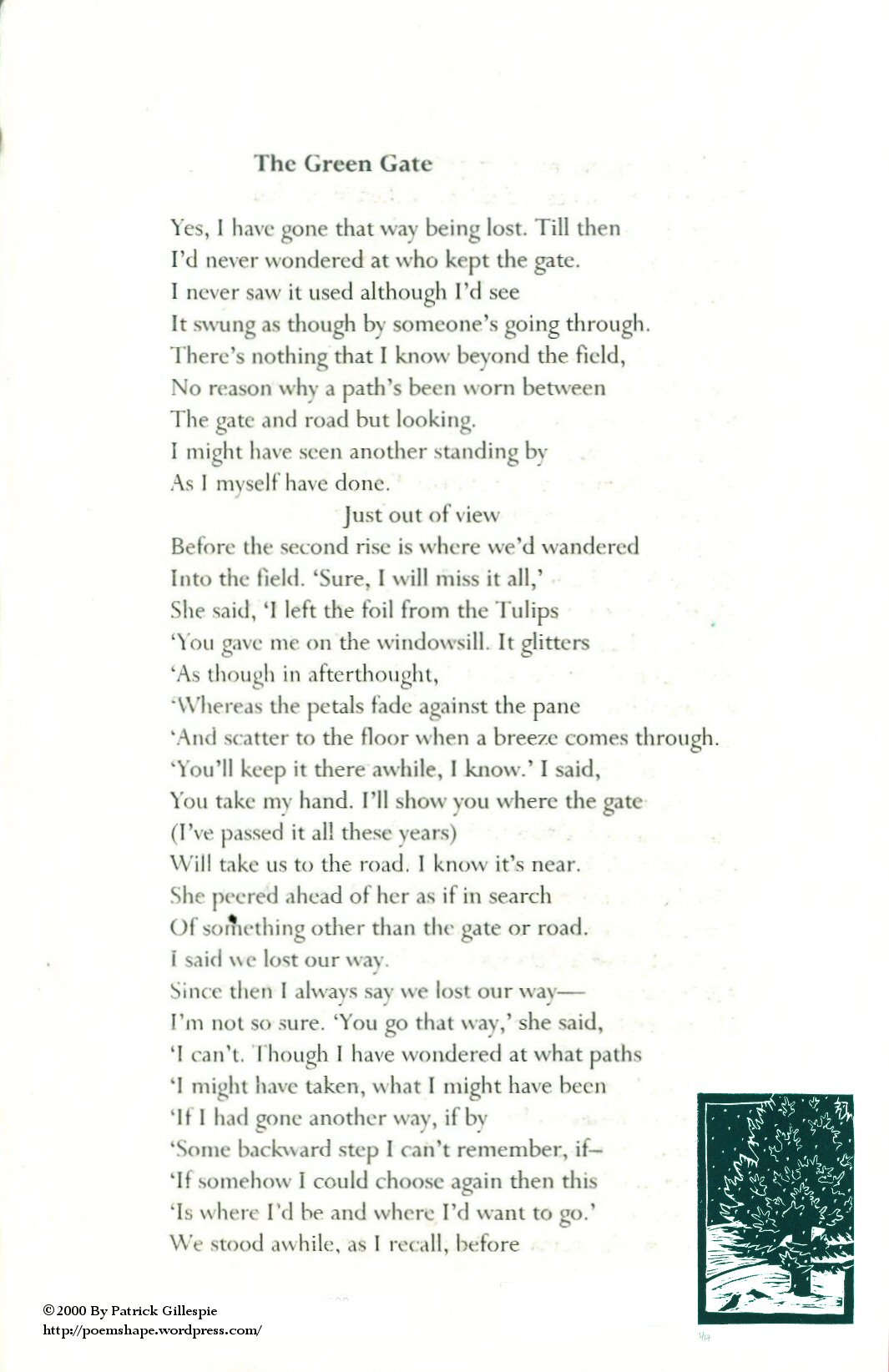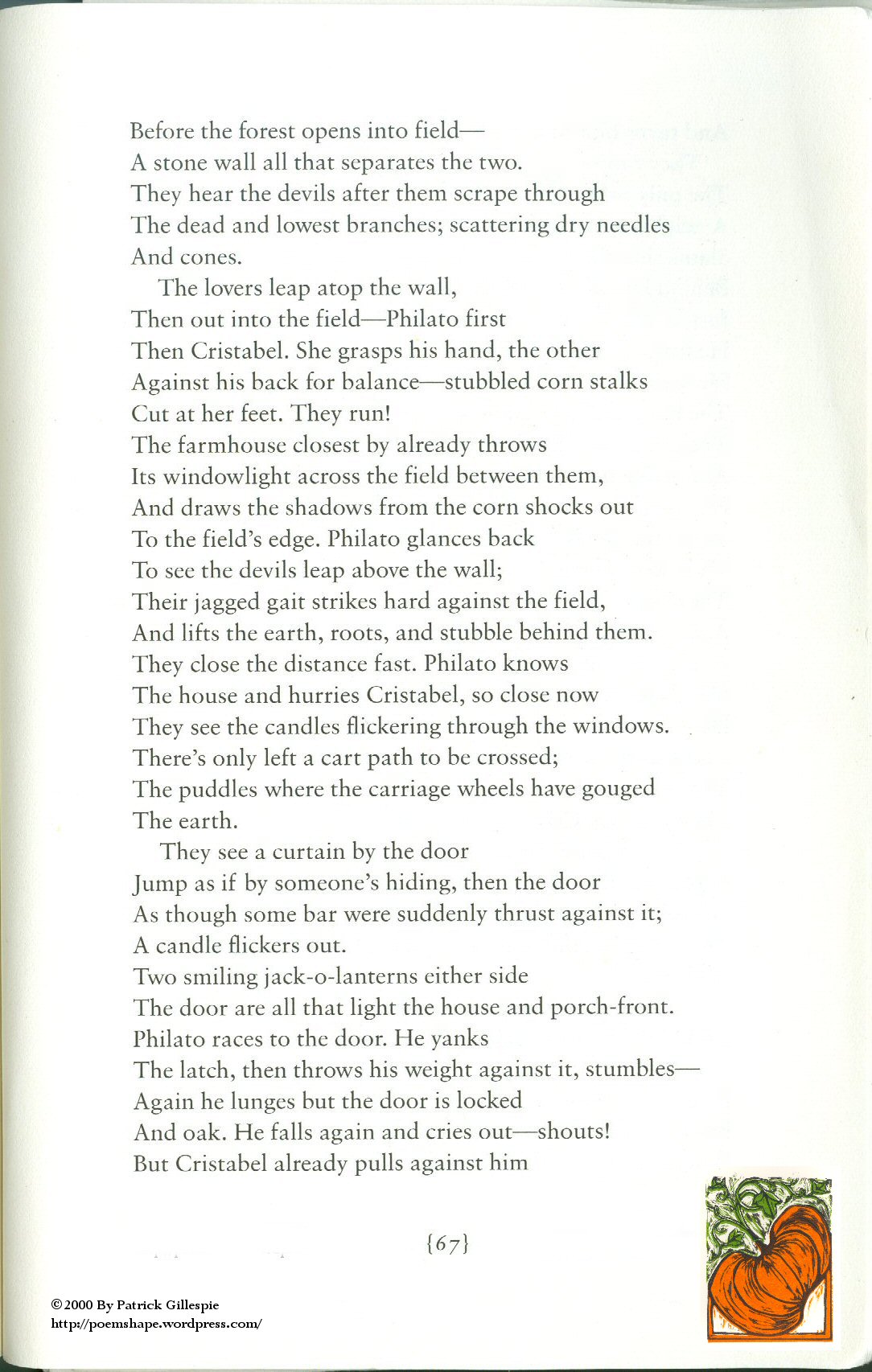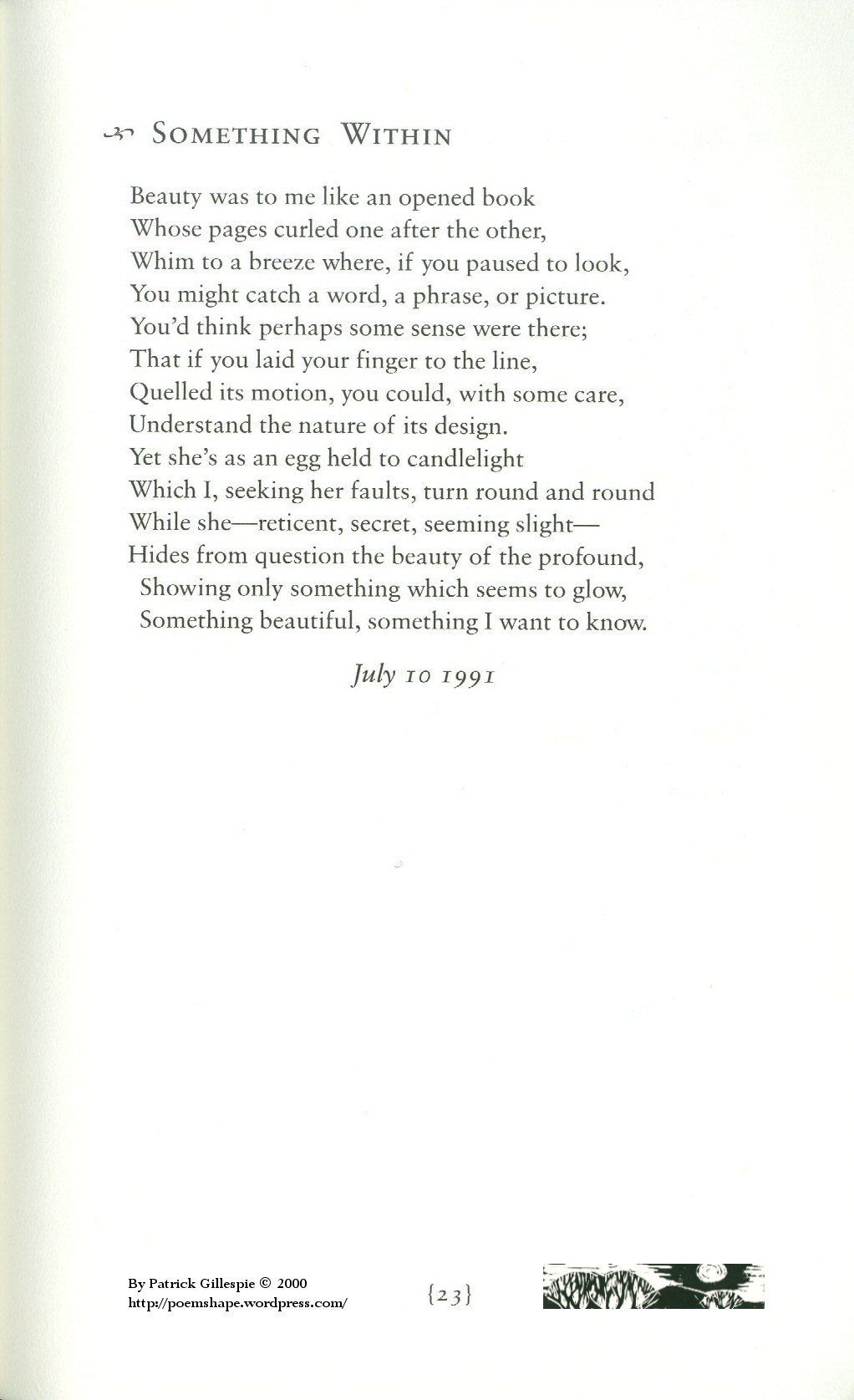Told on third day, after Pu-liang Yi’s Story of the Second Day

Said one trader to another: “Mistress Pu-liang Yi’s has left me as thoughtful as the nightingale that sings of nothing but thorns and roses. Let’s hear a fable of amusement!” Then the other traders agreed that they should hear Liang-chieh next. “It has been good day for travel, let’s have a goodly fable to match it.
Liang-chieh’s Story
I cannot match Yün’s thoughtfulness and I do not have Mistress Yi’s depth of feeling. I am as shallow as a ditch. But you say I have humor and wit! Ha! Didn’t we see the sun until its very nose sunk into the southern plains and didn’t we see how the birds followed after it? When I was a child I wished to be a poet but my father said he would sooner clothe an ox in tailored silk than raise his son a poet. He made me a merchant, bless him. Here is my tale!
The Monkey and the Crane
“Ha!” said the Monkey. “Love is just a word!
“What good’s a thing that can’t be seen or heard?
“What use? You cannot shake it from a tree
“Or root it from the earth. What use to me
“Or anyone? The tiger still must hunt,
“And if you cry out “Love!” it will not blunt
“Her appetite. She’d eat me all the same
“And leave me no one but myself to blame!”
*
The Crane was next. She said: “I know
“That love will never melt midwinter snow.
“It is not rain to April buds or earth
“To summer growth. The measure of its worth
“Cannot be judged by any worldly art
“Yet love is life and summer to the heart.”
*
The Crane and Monkey were the last to speak,
Then Lao-tsu said: “I see that some are meek,
“The lion and tiger proud. The hummingbird
“Is quiet. The elephant is loud. A herd
“Of bison will uproot a field. A crow
“Will squat unnoticed even in the snow.
“As all of you must know I have two suns.
“When one is in my hat the other runs
“From east to west. When one sun sets I lay
“The other in the east to rise. This way
“The sun is out no matter what the hour.
“Yet I have had no time to pick a flower
“No time to rest beneath a shaded wood
“Or sleep. Sleep would be nice. So, if I could,
“I’d like to find out two from all of you
“To whom I’ll give my suns. Between the two
“The world should still have sunlight while I rest.
“I cannot say which one of you is best
“Yet given what each said on love I’ll choose
“The monkey and the crane—the two whose views
“Were most extreme. I find each sun a jewel
“And hope if either animal’s the fool
“The other may be wise. At least one sun,
“That way, remains—a better end than none.”
*
Though the other animals feared the worst
The Crane and Monkey stayed apart at first,
Just as the Monkey’s sun set in the west
The Crane was taking hers from out her nest.
By turns they kept the sunlight round the earth,
That was, until, the Monkey’s usual mirth
Made his sun seem the brighter one to him;
And so, one day, he swung from limb to limb
Until he found the jungle lake he knew
The Crane most liked. From there he climbed into
A nearby tree until she was in sight.
*
“Ha!” He cried. “Your sun is not so bright!
“I’ve seen mine up when yours is in your nest
“And even when mine’s setting in the west,
“Yours rising makes not half the fire of mine!
“This afternoon I’ll climb a mountain pine
“That’s stretched its limbs as far as heaven’s roof
“And there I’ll lift my sun to yours as proof
“That mine is like a plate of beaten gold
“And yours a tarnished copper dulled and old.”
“Oh!” the Crane replied. “I had not thought
“To set one sun against the other! Not
“Because I was afraid! It may be true
“That your sun’s brighter, just that I know too
“It is not light but warmth that brings forth life.
“Yet if it puts an end to any strife
“I’ll grant your sun’s the brighter of the two.”
*
The Monkey thought on this. “This will not do!”
He said at last. “It stands against all reason!
“As any fool knows well the hottest season
“Is when the sun is brightest in the sky.”
To which the Crane responded: “Then why not try
“Your sun against my own where all can see?
“The world be judge instead of you or me.”
“Agreed,” the Monkey said, “as long as they pick mine!”
*
Instead of finding out a mountain pine,
When it was next the Monkey’s turn to take
His sun, he put it back instead to make
It climb again (though now from west to east!);
And to be sure its backward motion had not ceased
He sat and watched until he saw each sun
Was climbing slowly toward the other one.
The animals had never seen them both
At once! The smallest hid in undergrowth
And those that couldn’t just as quickly ran
Into the jungle fearing the work of man.
The Monkey saw and jeered at every one.
“Ha!” He said. “I see that even tigers run!
“Why if I’d known it was so easy, I
“Would long ago have put them in the sky
“And left them there.” To which the Tiger said:
“You silly Monkey! Tell us why instead
“Of gloating, why you’ve put both suns together.”
“Simple!” said the Monkey. “Tell me whether
“My sun’s the brighter or the crane’s!” And when
The Crane came next the Tiger asked again
The reason but she said the same. ‘The two
‘Of us alone could not decide. We’ve come to you!’
*
Then all the animals began to talk
And there were some who even dared to walk
From underneath the jungle shade till one
By one the others came to pick a sun
Until, as with the Crane and Monkey, they
Were at a loss to choose and could not say
Which one was best. The Snake, the first to speak,
Said: “I’ve seen both already at their peak.
“If any one of you were made to crawl
“As I, you’d know the earth is cold. For all
“The light reflected in a field of snow
“There’s nothing lives for long where those winds blow—
“The earth is made no warmer by that light
“When even through the longest summer’s night
“It’s warm. I’ll take the moonlight in July
“To January’s sun!” The Owl said in reply
That she liked neither sun. She said:“I knew
The world without them, for then I flew
“And there was never sun to light my way.
“What needed I the sun to hunt my prey
“Who hears the fieldmouse toeing through the wheat?
“In the dead of night the tiger’s not so fleet
“As I! Let all this daylight be undone!”
To which the Tiger said: “I like the sun
“That burns the brightest burning like my heart.
“I like it glistering on the breath at start
“Of day or brightly watching like my eyes
“At evening from the fields before it lies
“In shadow. When it speckles through the tree
“Against the forest floor it looks to me
“As though a tiger left his paw prints there,
“Aglow, before returning to his lair.
“I like the sun that’s burning like my heart.”
The Elephant spoke next, saying: “I part
“With all of you in what you’ve said. Of all
“I can remember best and best recall
“A time when there was both a night and day.
“The dust I throw atop my back to stay
“The sun was what the night was to the earth,
“A cooling balm against that heat as great in worth
“As all the world’s waters. There is none
“Who live for long where there is only sun
“And wind. This world without the passing night
“Is like a desert, the sun like a blight
“And all reduced to dust. Surely we must drink
“To live, and sleep at night. I cannot think
“The world was always meant to have two suns.”
*
“Ha!” said the Monkey. “Where all this runs
“Is anybody’s guess. It should be plain
“By now the sun belonging to the Crane
“Is neither warm nor brighter than my own!”
To which the Crane replied: “I should have known.
“To teach a Monkey reason can’t be done!
“Why I could sooner teach a snail to run
“Or an ostrich to dance a roundelay!
“If nothing else this, at least, is plain as day!”
*
The Tiger interrupted both. He said:
“You’d better look into the sky instead
Where both your suns have nearly reached high noon!”
Then both the Crane and Monkey saw that soon
The suns would have to meet! As if to flee
The Monkey clamored to the nearest tree.
The Crane cried out and leapt into the air;
Both knew well there was little time to spare.
The Monkey climbed the limbs by twos until
The suns hung just beyond his outstretched hand;
And even when he did his best to stand,
His tail wrapped round the branches topmost stem,
He could not grapple either one of them.
The Crane, as quickly as she could, tried too
And strained against the winds until she flew
Beside the suns but then she could not choose.
She cried “I cannot tell whose sun is whose!”
And sure enough the Monkey could not say.
He pointed, scratched his chin, looked this way
Then that. And by the time they both decided
It came too late for next the suns collided!
*
So much light none had ever seen. And still
The sky grew brighter by the moment till
There came a sound as if two great bells
Had each been struck. Then like cockleshells,
Each thrown against the other mid-air,
The smaller of the two was shattered, there,
In countless pieces, scattered through the sky!
Not a creature dared to lift an eye
But stayed where each had fled and not a sound.
Just the Monkey who’d fallen to the ground —
Felled branch by branch until he’d struck the earth.
He checked if he was still his usual girth —
His head and then his bottom. All was there.
And looking he could do no more than stare.
His sun now glowed a thin and papery light —
A watery silver hardly half so bright
As what it was. He saw the sky aglow
As with a sparkling dust. It seemed as though
The brilliance of his sun was swept away
And all the pieces sprinkled through the half-lit day.
His fiery sun was gone.
And yet the Monkey thought he’d never known
A sight as beautiful as stars and moon,
And felt content to stare all afternoon.
“Ha!” That’s all the Monkey ever said.
Some held it came from landing on his head.
But others said they’d rather grasp the joke –
And though they tried the Monkey never spoke.
“Ha!” he said. That was all. The other sun,
Jolted from its westward course, had spun
Unbroken far into the southern sky.
Yet even so the Crane still flew close by
As if she feared to let it from her sight
Unless it whirl unwatched into the night
*
Lao-tsu didn’t see the suns collide
But napping in a meadow close beside
A brook he’d woken up to find a moon
And stars had splashed the fading afternoon
With light — some stars were falling from the sky
And some left sparkling trails where they passed by.
He rubbed his eyes before he looked again
And stared, his mouth agape, and knew by then
Some unknown mischief had unfixed the world.
It looked as if a giant’s rage had hurled
The sun as far as earth and sky still met.
He thought it seemed to topple there and yet
He still could see the crane against its light
Before it finally rolled into the night.
“Where are my suns?” he cried and rushed to where
He’d left them in the crane and monkey’s care,
Yet not a single animal would say.
The snake lodged underneath a rock to stay
Until the sun returned. The owl had flown.
The Tiger skulked the jungle’s dark alone.
The elephant recalled a darker night
Before the monkey’s sun had left its light
In splintered pieces. Alone among them all
The monkey sat absorbed by what he saw,
Unmoved from where he’d fallen from the tree.
He’d curled and propped his head against his knee
To watch the spinning stars. Lao-tsu cried:
“I see the crane fly south and thought she tried
“To catch the sun before it slipped away!
“I see, as with the remnants of the day,
“The night is dusted with a glittering light!
“I see a ghostly ball ascend the night
“As if it were the shadow of a sun!
“From this I cannot reason what you’ve done!”
The monkey only looked dissatisfied.
“Ha!” he said before he moved a branch aside.
Then Lao-tsu stared at him a little while
And could not say if it were simply guile
Or if the monkey also couldn’t reason why,
Till finally both sat gazing at the sky
Together with their backs against the tree.
There was a moon and countless stars to see.
Then he finally spoke once more that night,
He said: “The sky and earth will of themselves be right.”
“Ha!”
Here Ends Liang-chieh’s Tale
Followed by Ji-Yuan’s Story on the Fourth Day .

 ·
·















































